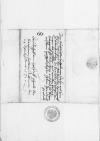Letter #5211
Ioannes DANTISCUS to Albrecht I von Hohenzollern-AnsbachHeilsberg (Lidzbark Warmiński), 1539-04-18
| received Königsberg (Królewiec), 1539-04-19 Manuscript sources:
Auxiliary sources:
Prints:
| ||||||||||
Text & apparatus & commentary Plain text Text & commentary Text & apparatus
Dem durchlauchten, hochgebornen fursten und hern, herrn
Durchlauchter, hochgeborner furst, hochgunstiger, lÿber her und freundt. / Unser freuntliche, wÿllige dinst zuvoran. /
Aus Ewer Furstlichen Durchlaucht cf.
Hie beÿ, wÿ uns Ewer Furstliche Durchlaucht bericht, / das dÿ im kortzen uns etliche handlungen und schrÿfften wollen zcu stellen etc., seÿ wir erbottig, / und uns gern woln gebrawchen lassen / so weÿt unser slecht vorstandt reÿcht, / wÿlferig und gefellig zcu sein, / dan Ewer Furstliche Durchlaucht, / in der gunst wir uns befelhen, / vÿl freuntlicher dinst, / und was wir sonst der selbten zu wolgefallen tzu thunn vormugen, / seÿ wir gentzlich geflÿssen. /
Datumm
qui supra manu propria subscripsit

